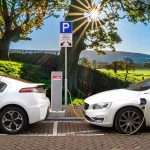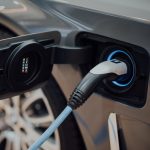Last Updated on August 26, 2022 by
Like any other vehicle, electric vehicles are susceptible to wear & tear too. However, an electric vehicle does not comprise as complicated parts as a regular vehicle.
Resultantly, they stand less chance of breaking down.
Maintenance on Electric Cars v/s Gas
EV buffs will tell you that electric vehicles are certainly cheaper to purchase, fuel and maintain. On the other hand, EV cynics will counter the claim by calling attention to the premium pricing of the many EV models.
Cost Analysis of an Electric Vehicle and a Combustion Engine
A report from the U.S. Department of Energy estimated that the average sustenance cost of a light-duty electric vehicle is not more than $0.07/ mile.
Whereas, the same report inferred that the standard maintenance cost on a combustion engine is nearly $0.10/ mile.
The sustenance schedule of a vehicle depends majorly on the year of the model and its making. Hence, these factors can’t be missed out on.
When it comes to the EV, the fact that there are few moving parts ensures a comparatively lower maintenance cost.
Oil Changes
Electric vehicles don’t need to require oil changes. It is because they are run by electric motors.
Combustion motors, on the other hand, need a regular check on their gas because their engines are powered by gasoline.
Electricity Cost v/s Gas Price
The prices of gas and electricity bills are constantly skyrocketing. The affordability of gas is on a decline.
The amount you pay for fuel depends on the place you live and the taxes levied by the government. There is no absolute and fundamental inference on what’s more affordable.
Nevertheless, EVs are in high demand because their fuel is more reasonable.
Why Do Electric Cars Require Less Maintenance?
One of the major reasons why people prefer electric vehicles lies in their easy maintenance. The limited & easy-to-deal-with parts neither require a regular examination nor does their maintenance burn a hole in one’s pocket.
- Less complexity in the working parts
Because there is no friction between the moving parts of the vehicle, it neither requires any lubricant nor any exhaust. Also, there is no exchange between the liquids and the gases.
This is the reason EVs don’t need any oil or exhaust mechanism.
- Lesser brakes depreciation
Electric Vehicles employ a distinctive type of brakes system called regenerative braking system besides the standard braking. This system ensures less pressure on the key machines involved and the tyres.
Hence, the parts don’t need frequent replacement.
Common Problems With Electric Cars
Whether or not to buy an electric car can be a puzzling question. Various tech mediums can be seen abuzz with divided opinions over the pros and cons posed by the vehicles.
Let’s have a consideration of the common problems raised by/in EVs.
- Higher vehicle and battery cost
- Inadequacy in the fuel and management infrastructure
- Lack of standard mechanisms
- Improper working under extreme conditions.
- More pressure on the electricity demands in the economy
- Alarming environmental issues like pollution
Electric Vehicle Safety Standards
Refuelling, environmental and safety standards are the prime factors behind the growth of the EV industry. And for the vehicle to enter the market, it must comply with the standard safety measure regulations.
Product Safety
The realm of safety is vast but product designing is an appropriate aspect, to begin with. For instance, the lithium-ion battery and high voltages used in it have a high energy density.
As a result, there have been instances of the vehicle catching fire while being parked or under some sort of mechanical operation.
Personnel Safety
The high voltage battery used in the vehicle makes it a bit harder to be serviced and examined from time to time. Personnel must be trained properly under the international standards while functioning for R&D, repair, testing and production etc.
Refuelling Safety
Electric Vehicles require special attention when it comes to safety while charging. It doesn’t only have to do with the charging station and the period for which it is charged.
EV maintenance also relies on the quality of the charger and the conditions involved in the installation.
Can You Drive and Charge an Electric Car in the Rain?
The answer is yes, it’s safe to drive while it’s raining. Even lightning doesn’t pose any risk to the ones sitting inside because even if the worst happens, the top metal is ready to give protection.
Now coming to whether there is any danger while charging during rains. Again, the answer is, no!
The charging stations and the plugs are designed by the manufacturing unit in a way that averts the possibility of potential shock or any damage.
Average Electric Vehicle Maintenance Costs
The maintenance costs are a major aspect that needs to be considered before buying any vehicle. When it comes to EVs, then the government provides subsidies and several tax rebates, besides various other maintenance benefits.
It comes off as no surprise that the maintenance cost of EVs is lower than non-electric vehicles . This is because of the lesser involvement of moving parts.
On the one hand, an EV has parts as few as four. Compared to this, the non-electric one can go up with as high as ten thousand.
A consumer report published that gasoline fuelled vehicles require an average expenditure of more than $9,000 in their lifetime. Whereas an electricity-powered vehicle requires $5,000 for battery replacement & other checks.
The Electric Vehicle Maintenance Schedule
EV doesn’t have any engines. Their maintenance doesn’t consist of oil changes or any other meticulous steps.
Electric cars run on exceptional technology that’s neither costly nor very hard to take care of. A battery is the life of the vehicle and hence, needs a special maintenance schedule.
- Every 8,000 to 11,000 km
Oil and filter replacement becomes necessary because lubrication between the moving parts needs to be done away with.
- Till 25,000 km
Transmission fluids and the engine air filters must be checked & replaced.
- At 48,000 km
The brake fluids need to be flushed & replaced. Besides, your car would need an engine coolant exchange too.
- At 72,000 km
It is advised to take the vehicle for a frequent overall inspection from now onwards. If needed, replace the brakes and the pads too.
- 1.2 lac km
This is the high time your vehicle would be needing a complete timing belt replacement. It’s important not to wait for the worst to happen to the engine before you get it done.
FAQ Relating to Electric Vehicle Breakdown
Vehicles that could run on electricity were a mere idea in the past. Today, EVs are no more just an idea but a reality because the invention is new, there are a lot of questions and curiosity around.
Let’s dive into the list of a few commonly asked questions related to EVs.
- How long do EVs last?
EVs are guaranteed a life range between 5-15 years, depending upon the model and regulations posed by the government.
- Do EVs wear out fast?
The answer is, no! The models that are finding their place in the market today are guaranteed a life of a maximum of 12 years or 150,000 miles.
- Are EVs dangerous in an accident?
EV batteries are not explosive, and neither do they have such elements that could potentially lead to a fire. The batteries even have an inherent cooling system.
Do Electric Cars Break Down More Than Gas Cars?
EVs are one of the most innovative breakthroughs of the century. They are equipped with state-of-the-art technology.
Still, they stand a chance of breaking down. But the important point to be noted is that possibility is less as happens in the case of conventional vehicles.
Are Electric Vehicles Less Reliable?
EVs are still under trial in a lot of parts of the world. Their reliability is a big question mark.
Numerous studies claim that EVs can be less reliable than gasoline vehicles. While there is a 19% likelihood of any causality in the case of a petrol-powered vehicle, the probability in the case of an EV is 31%.
What Is the Main Disadvantage of Electric Vehicles?
You might be well familiar with the advantages of EVs, but let’s now have a look at the cons.
- It takes longer for the battery to charge.
- The initial purchase cost is usually higher.
- Replacing the battery is an expensive affair.
- Unsatisfactory range cover on a full charge.
When compared to conventional vehicles, EVs are probably ranked lower in terms of the benefits they provide.
Considering all the factors mentioned above, it can be concluded that EVs cover less distance with more battery power that takes more time to get refuelled.
How Long Will an Electric Car Motor Last?
The average life of an EV ranges from 10-20 years. Although it depends on several variables that decide the life expectancy of the vehicle.
Factors that determine the life expectancy of an EV include-
- Model and the variant of the vehicle.
- Modifications & upgrades
- Age of the vehicle
- Infrastructure
- Vehicle utilisation
- Demographic elements
- Accident history
- Mileage
Keeping in view all these factors, the life of both a hybrid and an electric engine vehicle can be roughly determined. Nonetheless, it’s not an objective calculation that can yield sure results.
- Why Electric Vehicles Are Not Popular - January 29, 2023
- How Long Do Tesla Batteries Last Per Day? Battery Facts - January 25, 2023
- Do Electric Vehicles Have Air Conditioning? - December 21, 2022










